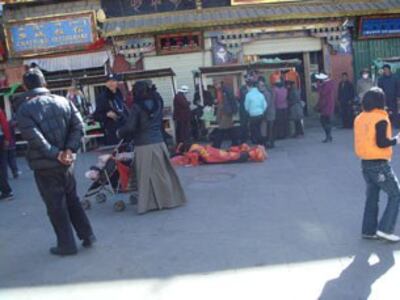WASHINGTON—Braving warnings from Beijing that the meeting would harm Sino-U.S. ties, U.S. President Barack Obama met here Thursday with Tibet’s exiled leader the Dalai Lama.
Obama used his first presidential meeting with the Dalai Lama to press Beijing, which has drawn international criticism for its heavy-handed treatment of Tibet, to preserve “[Tibet's] unique religious, cultural, and linguistic identity and the protection of human rights for Tibetans in the People’s Republic of China.”
“The president commended the Dalai Lama’s commitment to nonviolence and his pursuit of dialogue with the Chinese government,” the White House said in a written statement after the nearly hour-long meeting.
Tibetans inside China meanwhile reported special prayers and offerings in advance of the meeting, even as Chinese authorities further tightened security in the Tibetan regional capital, Lhasa.
Obama encouraged China and the Dalai Lama's envoys to continue efforts to resolve their differences through negotiations, although the talks have yet to achieve concrete progress.
Reporters were barred from the meeting, but the Dalai Lama told journalists on the White House driveway that he had expressed his admiration for the United States as a “champion of democracy, freedom, human values.”
Amid signs that relations between Beijing and Washington may already be cooling after the White House rejected Chinese demands to cancel the meeting, the Dalai Lama joined a group of Tibetan émigrés for a Tibetan New Year celebration.
China had warned that such a meeting, which the Obama administration turned down during the Dalai Lama's last trip to the United States, could further strain relations between the two countries.
Beijing regards the exiled leader, who fled Tibet for India in 1959, as a dangerous separatist.
More talks

The 74-year-old Dalai Lama was greeted by Tibetan well-wishers at a downtown hotel in Washington, tasting milk and tea served by children and throwing rice over his shoulder in a ceremonial offering.
The Dalai Lama’s lead negotiator during sporadic talks with China, Lodi Gyari, said the two men would discuss global concerns and the situation in Tibet, where China sent troops in 1950.
Gyari said the Dalai Lama would ask Obama to help find a solution in resolving the Tibet issue that would be mutually beneficial to the Tibetan and Chinese people.
Beijing has continued to oppose any meeting with the Dalai Lama, demanding last week that the United States reverse its "wrong decision" so it could avoid any more damage to Sino-U.S. relations.
Washington responded by saying the meeting would go ahead, and that the Dalai Lama, whom Beijing has described as “a wolf in monk’s clothes,” would also meet U.S. Secretary of State Hillary Clinton.
Complex picture

Analysts said the Dalai Lama’s visit could complicate Obama’s efforts to secure China’s help on key issues such as imposing tougher sanctions on Iran, resolving the North Korean nuclear standoff, and forging a new global accord on climate change.
Every sitting U.S. president has met with the Dalai Lama since George H. W. Bush in 1991, with then-president George W. Bush awarding the leader the Congressional Gold Medal in a high-profile ceremony in 2007.
While Obama will not appear in public with the Dalai Lama and, like his White House predecessors, will deny him the symbolism of meeting in the Oval Office, there are already signs that Sino-U.S. relations may be deteriorating since Obama’s November visit to China.
An official welcome from the People’s Liberation Army garrison in Hong Kong for the aircraft carrier USS Nimitz was conspicuously absent.
Chinese top brass are widely expected to snub the vessel during its four-day stop in the former British colony, and sent no representatives to the welcoming ceremony.
Nimitz’s visit comes after Washington’s recent decision to sell U.S. $6.4 billion worth of arms to Taiwan, which sparked threats by Chinese officials to freeze military exchanges with the U.S.
Beijing regards self-governing Taiwan as a breakaway province.
Original reporting by RFA's Tibetan, Mandarin, and Cantonese services. Written for the Web in English by Luisetta Mudie. Edited by Sarah Jackson-Han.
